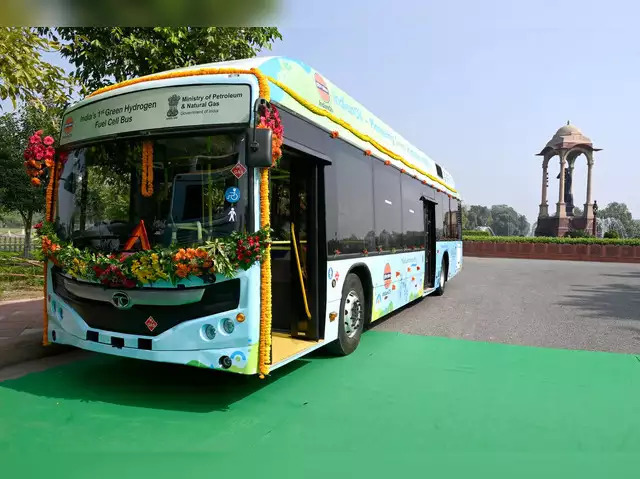Pooja Mahabadi, Pune
The Union Minister Hardeep Singh Puri inaugurated India’s first green hydrogen bus on Monday. The Ministry of Petroleum and Natural Gas has said that 15 other buses will be flagged off in parts of Delhi, Haryana and Uttar Pradesh.
Green hydrogen fuel cell buses, according to Puri, are, “the most environmentally friendly mode of transportation when compared to conventional buses. With three times the energy density and no toxic emissions, hydrogen stands out as a greener, more effective way to meet energy demands.”
The new bus made its debut yesterday on the arterial road that connects Rashtrapati Bhavan, the residence of the Indian President, with India Gate, an iconic symbol of national pride at the end of that road.
The Ministry of Petroleum and Natural Gas is actively driving green hydrogen initiatives such as refinery production and utilization, hydrogen blending in natural gas pipelines, localization of electrolyzer-based technologies, and promotion of bio-pathways for green hydrogen production.
Indian Oil, the country’s state-owned petroleum corporation, has a cutting-edge research and development center in Faridabad, near Delhi, to investigate fueling green hydrogen produced by electrolysis with solar panels.
Puri predicts that new fuels such as hydrogen and biofuels will account for 25% of worldwide additional energy demand increase over the next two decades. The hydrogen-powered buses emit only water and will eventually be tested on designated routes in Delhi, Haryana, and Uttar Pradesh. Green hydrogen is being produced for testing by the Indian Oil Corporation’s R&D Centre in Faridabad. Using solar photovoltaic panels, this facility can refill green hydrogen created by electrolysis.
The buses have four cylinders with a capacity of 30 kg that can power the buses for 350 km. Refueling time has also been reduced, with the four tanks now filling in 0-12 minutes. Green hydrogen is completely sustainable, emitting no damaging emissions during combustion or manufacture.
Hydrogen, dubbed the “future fuel,” has enormous promise in assisting India in meeting its decarbonization goals. The global demand for hydrogen is expected to more than quadruple by 2050, reaching 500-800 million tonnes. Domestic consumption is expected to treble, from 6 million tonnes today to 25-28 million tonnes by 2050.
